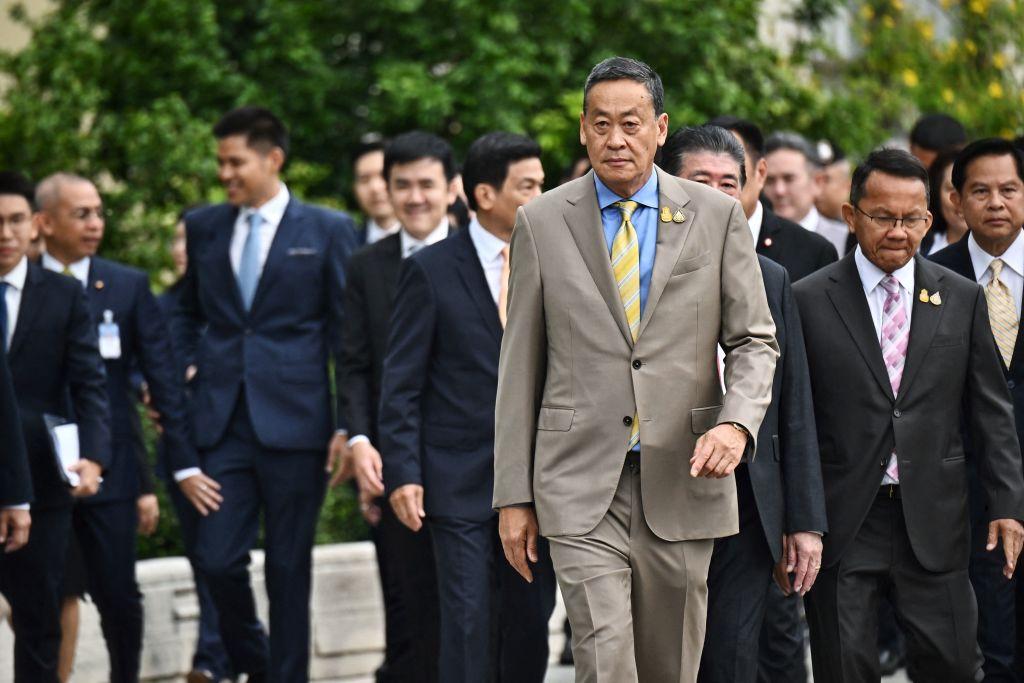
Thai politics were in a muddled state prior to 22 August 2023. Following the general election in May, there was much speculation about who would become the next prime minister and how the old establishments would leverage their political power to achieve their desired outcome.
According to most Thai news sources, it was widely believed that the prime minister’s seat would be assumed by Prawit Wongsuwan, the former deputy prime minister, leader of the Palang Pracharat Party and a key figure behind numerous clandestine political deals. Rumours were rife about whether there was a special deal between the monarchy and the autocrats.
Three months after election day, the covert political warfare between Thailand’s populist Pheu Thai Party, the alliance of conservative political parties including Palang Pracharat, and the military-appointed senators finally came to light and undermined Prawit’s shot at power.
On 22 August, Thailand witnessed two significant political events. First, Srettha Thavisin, a real estate magnate from the Pheu Thai Party, was appointed prime minister. Second, Thaksin Shinawatra, the former prime minister who had been in exile for 15 years and was the influential force behind the Pheu Thai Party, returned to Thailand. When he emerged from the terminal, he paid homage to the portraits of the Thai king and queen, and then greeted his supporters.
Immediately afterwards, corrections officials escorted Thaksin to jail. He submitted a request for a royal pardon on 31 August and King Maha Vajiralongkorn granted it the next day, reducing Thaksin’s jail time from eight years to just one.
The Thai people, once deeply polarised between pro-democracy red shirts and pro-royalist yellow shirts, now find themselves baffled by the unusual alliance forming the new governing coalition. The red shirts, who are anti-military rule, pro-democracy and opposed to the royalist conservatives, support the Pheu Thai Party.
The yellow shirts, who despise Thaksin and his allies, are strongly against those whom they believe want to abolish the monarchy by amending the lèse-majesté law and support pro-military parties like Palang Pracharat and the United Thai Nations Party. But the new alliance between these two opposing political camps has led many Thais who once staunchly supported their ideological camps to question where their loyalties lie.
As the dust settles in Thailand, the extent of the post-election political manoeuvring has come to light. The new cabinet ministers, now royally endorsed, include familiar faces from General Prayut Chan-o-cha’s previous government and members once labelled as ‘pro-democracy’ from the Pheu Thai and Palang Prachachat parties. The new alliance has also seen several inexperienced ministers appointed to high-level cabinet positions.
The political divisions in Thailand can now broadly be categorised into three distinct groups. The first group consists of those who steadfastly support their leaders and whatever they do. The second group comprises staunch supporters of their political camp, who have become disillusioned by their leaders’ alliances with the opposite camp. Phumtham Wechayachai, the Pheu Thai Party deputy leader, spearheaded the unusual alliance, saying that all Thais needed to swallow their pride ‘in order for the country to move on’.
The third group includes those who supported the Move Forward Party. These people were disillusioned from the beginning because, though their party won the most seats in the election, it did not form government. This third group has continued to support the Move Forward Party, which now serves as the opposition.
With the governing coalition formed and ministers appointed, the Thai people are looking at what the future holds for them and the country’s politics. Staunch supporters of Thaksin remain defenders of the Pheu Thai Party, even going as far as protecting political figures from the pro-royalist camp. Those disillusioned by the Pheu Thai Party will likely shift their support to the Move Forward Party in the next election, given their shared pro-democracy ideology. But those in the pro-royalist conservative camp, who felt betrayed because their leaders and the monarchy supported Thaksin’s return, will likely remain loyal to their political camp. Their ideologies are too conservative to align with the Move Forward Party. Pro-royalist conservatives will likely continue to search for loopholes to undermine Thaksin and the Pheu Thai Party.
While the conservatives and Thaksin’s camp may be aligned, mutual trust is lacking. Their alliance remains fragile and could disintegrate at any moment. The military remains a key cleavage. Even though the Pheu Thai Party’s campaign rested on an anti-military stance, Prime Minister Srettha and Minister of Defence Sutin Klungsang are ostensibly intent on supporting the military’s interests. Pandering to the directives of the Thai military is most likely an effort to prevent another coup.
The past four months of political tumult have shown that Thai citizens have little influence over their nation’s affairs. The formation of the coalition, the government’s alignment with the military, the political arrangement between autocrats and the monarchy, and the swift return and subsequent release of Thaksin have revealed that the interests of the Thai people have never been a top priority. To the autocrats and the monarchy, what matters most is the preservation of their power.